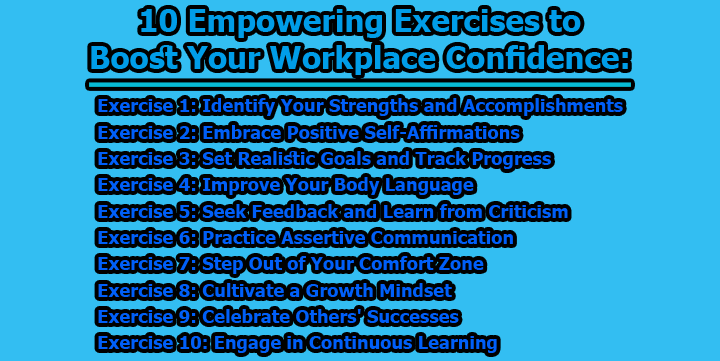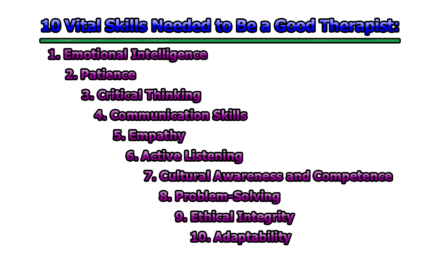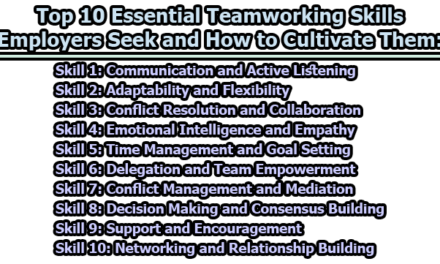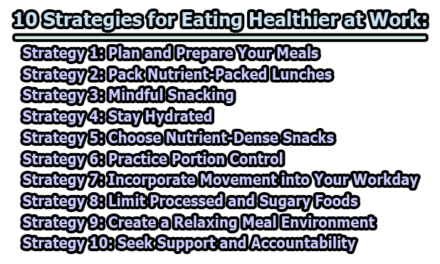10 Empowering Exercises to Boost Your Workplace Confidence:
Confidence plays a vital role in the workplace, influencing career progression, decision-making, and overall job satisfaction. However, many individuals struggle with self-doubt and low confidence, which can hinder their professional growth. The good news is that confidence is a skill that can be developed and strengthened through consistent effort and practice. In this article, we will explore the 10 empowering exercises to boost your workplace confidence.
Exercise 1: Identify Your Strengths and Accomplishments
Begin by reflecting on your unique strengths and past accomplishments. Create a list of your achievements and contributions to your organization, no matter how small or significant. Take pride in your successes and acknowledge the value you bring to your team and projects. By recognizing your capabilities, you can build a strong foundation for increased workplace confidence.
Exercise 2: Embrace Positive Self-Affirmations
Challenge your negative self-talk by adopting positive self-affirmations. Develop a list of empowering statements such as “I am capable,” “I am deserving of success,” and “I believe in myself and my abilities.” Repeat these affirmations daily, especially during moments of self-doubt, to rewire your brain and build a more confident and optimistic outlook.
Practice saying these affirmations in front of a mirror, internalizing them with conviction. When faced with challenges or difficult situations, recall these affirmations to reinforce your belief in yourself. Over time, positive self-affirmations will become a powerful tool in boosting your self-confidence and nurturing a growth-oriented mindset.
Exercise 3: Set Realistic Goals and Track Progress
Establish clear and achievable professional goals for yourself. Break these larger objectives into smaller, manageable milestones. Be specific about what you want to achieve and set deadlines to track your progress. Celebrate each achievement, no matter how minor, as it will boost your motivation and confidence.
Creating a visual representation of your goals, such as a vision board or a progress chart, can help keep you focused and inspired. Review your goals regularly and make adjustments as needed. Celebrate your successes, and don’t be disheartened by temporary setbacks. The act of setting and accomplishing goals will strengthen your belief in your abilities and encourage you to take on more significant challenges.
Exercise 4: Improve Your Body Language
Your body language can significantly impact how others perceive you and how you feel about yourself. Practice open and positive body language by standing tall, maintaining eye contact, and using gestures that convey confidence and approachability.
Engage in power poses, which involve standing in expansive postures that convey strength and confidence. Research has shown that adopting power poses for a few minutes before important meetings or presentations can lead to an increase in feelings of self-assurance.
Be mindful of your body language in various professional settings, such as meetings, interviews, and networking events. Positive body language not only influences how others perceive you but also affects your internal state of mind, reinforcing your sense of confidence.
Exercise 5: Seek Feedback and Learn from Criticism
Don’t fear constructive criticism; instead, see it as an opportunity for growth. Request feedback from colleagues, mentors, or superiors, and be receptive to their insights. Constructive feedback can provide valuable insights into areas where you can improve and build upon your strengths.
To make the most of feedback, adopt an open and non-defensive mindset. Avoid taking criticism personally and focus on the specific aspects that can be improved. Use feedback as a tool for self-improvement, and remember that no one is perfect; continuous learning and growth are essential for personal and professional development.
Exercise 6: Practice Assertive Communication
Effective communication is crucial in the workplace, and assertiveness is a key component of it. Practice expressing your thoughts, ideas, and opinions with clarity and confidence. Use “I” statements to convey your views assertively without being aggressive or passive.
When communicating, maintain a firm yet respectful tone and avoid using qualifying language that diminishes your point of view. Active listening is also an essential part of assertive communication, as it shows respect for others’ perspectives and fosters a collaborative atmosphere.
As you master assertive communication, you’ll gain respect from your peers and superiors, reinforcing your self-assurance in professional interactions.
Exercise 7: Step Out of Your Comfort Zone
Growth and confidence go hand in hand. Make it a habit to step out of your comfort zone and take on new challenges. Volunteer for tasks or projects that stretch your abilities, and don’t be afraid to take calculated risks.
Push yourself to participate in activities that might initially make you uncomfortable, such as public speaking or leading a team. Embracing new responsibilities and opportunities for growth will expand your comfort zone and increase your belief in your abilities.
Remember that stepping out of your comfort zone doesn’t necessarily mean taking enormous leaps; it can be as simple as speaking up in a meeting or volunteering for a task outside your usual role. Each step outside your comfort zone builds confidence and resilience.
Exercise 8: Cultivate a Growth Mindset
Adopt a growth mindset, as popularized by psychologist Carol Dweck. Embrace failures and setbacks as opportunities for learning and improvement, rather than as signs of inadequacy. Understand that no one is perfect, and it’s natural to encounter obstacles along the way.
View challenges as opportunities to develop your skills and knowledge. Approach problems with curiosity and a willingness to learn from your experiences. Cultivating a growth mindset will build resilience, allowing you to bounce back stronger from challenges and setbacks.
As you embrace a growth mindset, you’ll recognize that setbacks are not indicative of your worth or abilities but rather stepping stones toward growth and improvement. This mindset shift will contribute to a more confident approach to overcoming obstacles in your career.
Exercise 9: Celebrate Others’ Successes
Confident individuals support and celebrate the success of their colleagues. Avoid falling into the trap of comparison and jealousy. Instead, acknowledge and celebrate the achievements of your teammates.
Be genuinely happy for their accomplishments, and offer sincere congratulations. Cultivate a positive and collaborative work environment, where everyone’s accomplishments are recognized and applauded. Such an attitude of abundance will liberate you from self-doubt and contribute to your own sense of confidence.
In addition to celebrating the successes of others, learn from their achievements. Observe what strategies and approaches led to their accomplishments and consider how you can apply similar methods to your own goals.
Exercise 10: Engage in Continuous Learning
Commit yourself to lifelong learning and professional development. Seek out opportunities to expand your knowledge and skills. Attend workshops, seminars, or online courses that align with your career aspirations.
Continuous learning keeps you up-to-date with industry trends and best practices, making you more competent and confident in your field. It also demonstrates a proactive approach to self-improvement, which can be viewed positively by employers and colleagues.
Consider joining professional associations or networking groups to connect with like-minded individuals and gain insights from seasoned professionals. Engaging in continuous learning will not only expand your expertise but also boost your confidence in your abilities to tackle new challenges and contribute to your organization’s success.
In conclusion, building workplace confidence is an ongoing journey that requires dedication and perseverance. By incorporating these ten empowering exercises into your daily life, you can gradually boost your confidence and achieve greater success in your professional endeavors.
Remember, confidence is not about being flawless; it’s about believing in yourself, embracing growth, and facing challenges with courage and determination. As you practice these exercises consistently, you will discover newfound strength and self-assurance that will propel you to new heights in your career.
Be patient with yourself and celebrate your progress along the way. Embrace the process of building confidence, and you will witness the transformative power it has on both your professional and personal life. So, take the first step towards a more confident you, and watch your workplace confidence soar.
Frequently Asked Questions [FAQs]:
How can I boost my confidence at work?
Boosting confidence at work involves a combination of self-awareness, skill development, and mindset shifts. Some effective strategies include identifying your strengths and accomplishments, practicing positive self-affirmations, setting realistic goals, seeking feedback, and stepping out of your comfort zone.
How can I overcome imposter syndrome in the workplace?
Overcoming imposter syndrome involves recognizing and challenging negative thought patterns. Focus on your achievements and capabilities, seek support from mentors or colleagues, and remember that everyone experiences self-doubt at times. Embracing a growth mindset and celebrating your successes can also help combat imposter syndrome.
What is the importance of body language in the workplace?
Body language plays a significant role in workplace communication. Positive body language, such as maintaining eye contact and open gestures, can convey confidence, approachability, and professionalism. Being mindful of your body language can positively influence how others perceive you and how you feel about yourself.
How can I improve my communication skills at work?
Improving communication skills involves active listening, assertive expression, and clear articulation. Practice active listening by focusing on understanding others’ perspectives. Develop assertive communication by expressing your thoughts and ideas confidently and respectfully. Practice public speaking or join communication workshops to refine your skills.
What are some effective ways to cope with workplace challenges?
Coping with workplace challenges requires resilience and problem-solving skills. Embrace a growth mindset to view challenges as opportunities for learning. Seek feedback and support from colleagues or mentors. Break challenges into smaller tasks and set achievable goals. Engaging in continuous learning can also equip you with the skills needed to overcome obstacles.
How do I handle criticism constructively?
Handling criticism constructively involves staying open-minded and receptive to feedback. Focus on specific areas that can be improved, and avoid taking criticism personally. Use feedback as a tool for growth and development. Remember that constructive criticism can help you refine your skills and become more effective in your role.
How can I balance assertiveness and collaboration in the workplace?
Balancing assertiveness and collaboration is crucial for effective teamwork. Practice assertive communication while respecting others’ viewpoints. Seek consensus through open discussions and compromise when necessary. Strive for win-win solutions that benefit all parties involved.
What role does continuous learning play in career growth?
Continuous learning is essential for career growth and staying relevant in a rapidly changing job market. Acquiring new knowledge and skills can enhance your expertise, making you more valuable to employers. Engaging in continuous learning shows initiative and a commitment to professional development.
How do I celebrate the achievements of my colleagues without feeling envious?
Celebrating colleagues’ achievements involves adopting an abundance mindset. Focus on your own strengths and successes while acknowledging and supporting others. Remember that celebrating others’ accomplishments does not diminish your own capabilities but contributes to a positive work environment.
How can I maintain confidence during periods of uncertainty or change?
During uncertain or changing times, maintaining confidence involves focusing on what you can control and adapting to new circumstances. Embrace a growth mindset to view challenges as opportunities for growth. Seek support from colleagues or mentors, and remember that resilience and adaptability are essential traits in navigating uncertainty.

Library Lecturer at Nurul Amin Degree College










